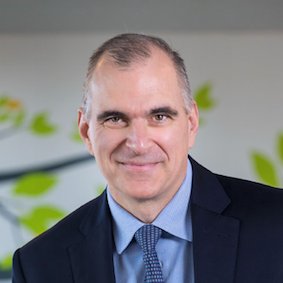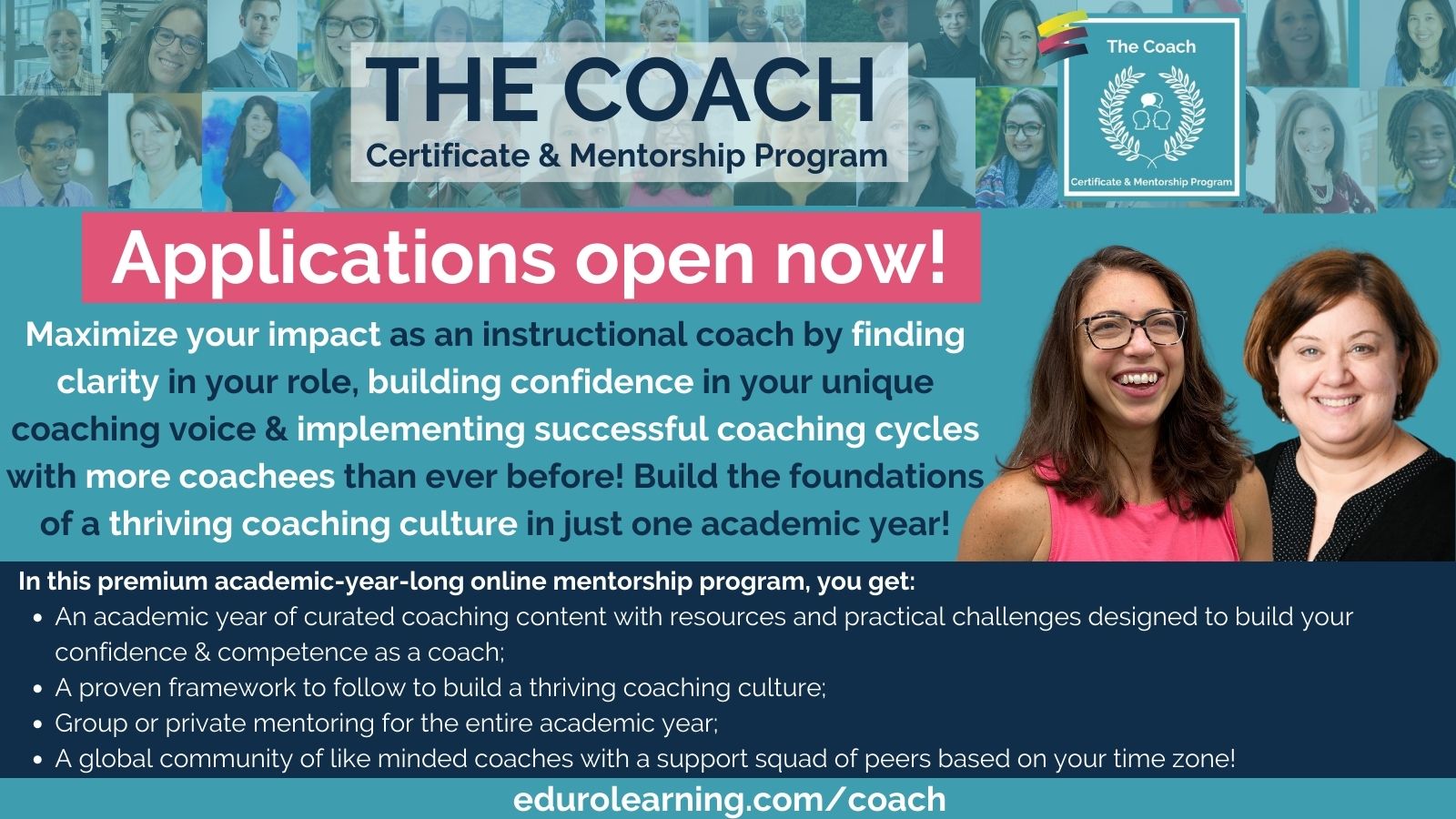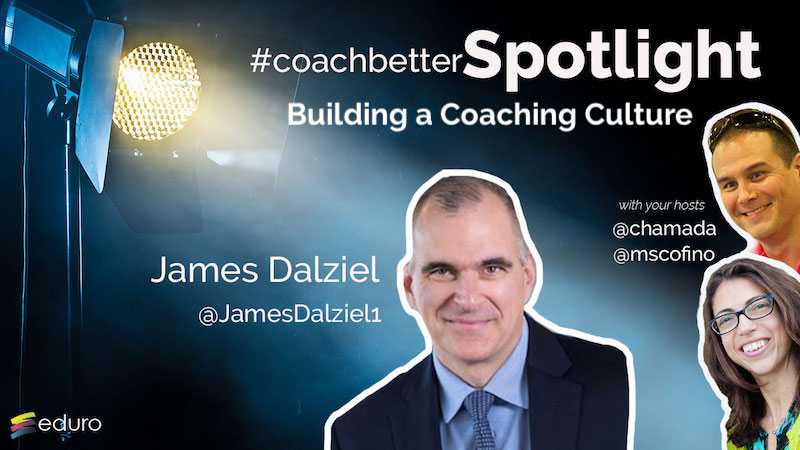James shared his experience building a coaching culture from the ground up in the new East Campus of United World College Southeast Asia, and then how he’s creating that culture in an existing school in his new role at GEMS in Switzerland. In every action, James prioritizes kindness and positive assumptions, and it’s clear from his intentional (and often informal) interactions with his colleagues and community stakeholders that he’s a leadership role model for any coaching environment.
Subscribe to #coachbetter via your favorite Podcast Player!
Featured Guest

Bonus! Watch the Spotlight Version on YouTube!
Show Notes
Tell us a little bit about your experience with coaching at UWC (school-wide scale):
Had the opportunity to open a new campus with a strong mission. Asked themselves: how do we want this to feel for the whole community? Intentionally looked for practices, norms and structures that would help them get there. Started with Martin Skelton from Fieldwork Learning: how are schools improving student learning? What structures did we need to get there? Started talking to Bill and Ochan Powell about Cognitive Coaching. Started with the leadership team to try it out. Felt right from the leadership team. Used Cognitive Coaching as one way to get them there.
How would you define the work that coaches do? What’s your vision of coaching?
It was very organic and gut instinct, not seamless or perfect, it was normal. It felt right, so we kept doing what felt right. We wanted a community that was thoughtful and paid attention and invested time in careful thinking. Coaching helped facilitate that. We liked Cognitive Coaching in particular because of the options to be in a consulting, collaborating modes as well.
What worked really well? What was challenging?
Having a strong mission and staying focused on that. Talking about how they wanted the school to feel as a community. Honesty about things they didn’t get right, openness about what didn’t work and the ability to back up and try again. Simple problems, complicated problems and complex problems. In a complex environment, variables are changing all the time. If it works, amplify it, if it doesn’t stop doing it. We treat schools like complicated problems and we can fix issues with best practice. Schools are more dynamic than that. We needed to give us the permission to try something, fail, recognize it and try again.
Constantly recalibrating how we’re measuring success. It’s not always easy to do this with people. Often going on how things feel – right or not.
Understand and recognize how long change takes in a school. It took some time to embed the coaching culture within the norms of what we did.
Are there particular challenges to building a culture at this scale?
UWC: 2800 students. GEMS: 320 students. Leadership at a distance. In a bigger organization it just takes longer. Alignment through the leadership team becomes more important at a bigger organization. It’s not all about you, the leadership team constantly talked about the direction the school was going.
A success criteria: team could disagree with each other in very positive ways. When we got to the transformative level, it was when we could really openly disagree and discuss.
Just because it works in the past, doesn’t mean it’s going to work in the future. Need to stay in dialogue for longer: listen and understand, come up with new thoughtful ways to move forward. Process is more important than procedure.
You’re never done as a coach, we’re always getting better. We need to practice.
How do you get that unifying feeling / vision throughout the whole school?
Start with what’s our common ground? What can we agree on? Then have dialogue: what does that mean for you as a science teacher? What does that mean to you in a pastoral role? What does that mean on a field trip? Over time we come to some agreement. Don’t want to put ourselves in a box by defining too closely. Find opportunities to coach individuals: What does this look like for you? For example: have conversations with stakeholders “If we talk about the community being important for us, in what ways does this manifest for you?” Moving through the roles of Cognitive Coaching in conversations with stakeholders.
How do you share this back to the whole school?
Temporary fixed position (from FieldWork Education). Need to be able to move between theory and practice. Leaders need to be able to step up to the balcony, but also recognize that the world takes place on the dance floor. At whole staff meetings, can bring everyone back to the same message – but it’s equally important to do that in small moments (in the hallway, for example). Take every opportunity to remind people that we’re here because our goal is xxx (for example at the beginning and ending of every meeting). Take every opportunity to be mindful, kind, knowing I don’t have all the answers, but to work with the whole community.
How do you make everything feel so casual, when it’s clearly intentional?
Replace “casual” with “safe” – keep in mind how people are feeling, and working with individuals in a way that makes them feel safe. Genuinely listen, without an agenda, without the goal of changing your thinking.
How did you ensure that the whole leadership team was on the same page?
Lots of discussions. It’s ok to not have all the answers. Genuine belief that this was how we could improve student learning. Started hiring teachers and leaders who would have similar tendencies, rather than specific teaching experience.
How do you balance two roles of coach and evaluator?
Our default assumption is that the answer lies within the person we’re having the conversation with. If we’re at a dead end, would break rapport, leave coaching, and say “do you mind if I offer some advice”, go back into rapport, go back into coaching “of those 3 things I shared, what might work best for you in this situation?” Part of my responsibility is to help colleagues get better. We’re not just a learning school for students, we’re a learning school for everybody.
Every final staff meeting of the year: What do you know? What can you do? What do you understand? Now, that you couldn’t do in August? What helped or hindered this?
Was there anything that didn’t work?
Schools are constantly changing. We need to keep up. How am I going to imperfectly keep up with it? What’s my best guess at what I need to do?
The idea of being kind never fails too badly, building rapport, taking every opportunity to build trust (following through with things promised), making it safe for people. One of the most important norms: presuming positive intent (take people’s actions and ask the question “if this was positive, what was the intent?” stay in those conversations). Safe environment: ok to take risks and fail. Don’t measure the success today, and think you’ve failed tomorrow. We’re different people each day. We need to try our best every day. It’s a human relationship, by definition, we’re always changing.
When things go wrong, they often don’t work because we’ve chosen the wrong support function (being clear about what the teacher needs to be successful and coaching choosing the right venue to get there).
How has it been different going into a school with an existing culture that you didn’t build?
Blank slate is much easier. Culture has its baggage and I have mine. Frames of reference, belief systems all very different. Throw all assumptions out the window, keep positive assumptions at the forefront. At the end of the day, I’m now part of this team. I need to help and work so that I can understand how we can move forward. Meet people where they are. Let me figure out where we all are, and we can all work together to move forward. Start with some fairly sticky points, like the mission, and then move to the next level “what does that mean for us as a community?” Not coming into the school with an agenda, genuinely coming in with “let’s see where this community is” with some boundaries in place, know that we want to increase student capacity, etc. Leadership for innovation: create barriers for people: we have x amount of time and x amount of resources, this is our sandbox and we want to play in it.
We’re all heading in the same direction, but I’m not expecting everyone to march in sync. I want people to get there in their own way, that’s part of the richness of the organization. Let’s figure out 5 new ways to get there – that’s exciting! People really value the autonomy to be a creative practitioner in education.
Lack of ego – it’s not “my” agenda. You can support someone else’s thinking so much so that they can come up with such an amazing idea that you never would have thought of. There are some things that I think I know work well, doesn’t mean it’s going to work now. Careful to stay out of the “best practice” trap.
Words matter. What you say and what you do, matter. It might not be until a year from now.
Level Up Your Coaching with The Coach!
If you are ready to dive deep into your coaching practice, to help you #coachbetter and build a thriving coaching culture in your school, please join us for our next cohort of The Coach!
Wherever you are in building a coaching culture in your school, The Coach will give you the strategies, skills and tools you need to make coaching a success and will empower you to confidently apply instructional coaching strategies in any situation – from building a coaching program, to having coaching conversations, to being a leader in your school community. We facilitate only one cohort each academic year so we can offer individualized support for each participant.
Coaches of all levels are welcome: you’ll start the program with a self-assessment to determine exactly what the next steps are for you!
Registration for our next global cohort opens once a year – check the website for details!






Recent Comments